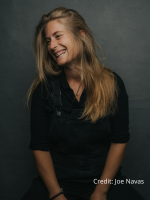Stephanie Morningstar is coordinator for the Northeast Farmers of Color Land Trust. The group started in 2017 as an informal alliance between farmers of color at Soul Fire Farm and Wildseed Farm in New York and Global Village in Grafton, Massachusetts.
In the group's formative moments, the farmers of color came together and named some of the barriers and challenges they faced in the northeast.
“The number one barrier that was named was land access. In the northeast nearly 99% of farmland is owned by white folks, but the hands and labor on that land are overwhelmingly black and brown,” Stephanie said.
These statistics are true across the U.S. In our country whites own 98 percent of all private U.S. agricultural land.
“The United States and the current Western system that we all live under was created off the stolen labor and the stolen land of black folks and native land. It’s not something that anybody really wants to look at or discuss, right? Like why would we talk about or focus on the fact that you know settlers came to these lands and basically just started taking land and building a system that is benefiting very specifically settlers without looking at—with deeply marginalizing indigenous people and black folks because what we’re equated to are land and labor.”
The Northeast Farmers of Color Land Trust aims to be part of changing this systemic inequality. Once the original alliance identified access to land as the number one barrier for farmers of color, they started working to create a land trust in January of 2019. They’re still finalizing the legal structures of the land trust, and they’ve started receiving pledges of land donations across the northeast.
“We don’t believe that we can truly own land quote unquote but when we’re talking about taking land under our care and growing food and medicines for our communities, we’re looking at land through an indigenous lens. And when I say indigenous I don’t mean necessarily indigenous to just the northeast or North America but globally indigenous. We carry these very specific values and covenants that see land as more than just something to extract from.”
Stephanie says this stewardship approach means creating access to land for farmers of color not just for sustainable agriculture, but also for human habitat, ceremony, native ecosystem restoration, and cultural preservation. It’s a holistic way of looking at land access and stewardship that’s very different from the approach of our dominant culture.
“The challenges people of color in the food system experience are a direct representation of something we call and that’s known as extractive settler colonialism. And what that means is colonialism is when you go out and you kind of like go to one place and do some sort of extraction and then you leave. Settler colonialism is when you stay and keep extracting, and that’s what’s happened here.”
It’s not just a policy, it’s a mindset. Extractive settler colonialism is based on a culture of separation and control. All of our big systems are built on this kind of thinking—and particularly our food systems.
“So right now for example we’re in this pandemic, and the pandemic is really casting a light on the cracks in our foundation of the food system. It’s showing really those who have access to resources, and those who are hoarding resources, and those who are left behind who have little to no access to fresh food. The system is crumbling it’s not something and COVID is really showing that, that the system is not sustainable the way that it’s being built right now.”
It’s not an accident of history, Stephanie says, that the health of the land has deteriorated to the point of urgency under our current systems. She reminds me that the climate crisis is a direct result of our culture of this extractive settler colonialism. The Northeast Farmers of Color Land Trust believes that opening access to land to people of color can heal not just the land, but also our relationships as human beings.
--
Find more about NEFOC here.
This piece first aired in June 2020.








